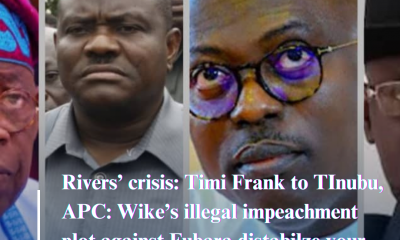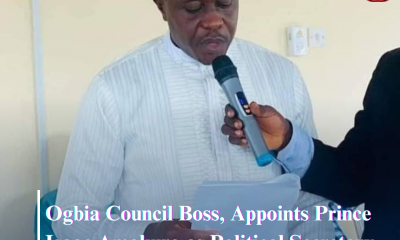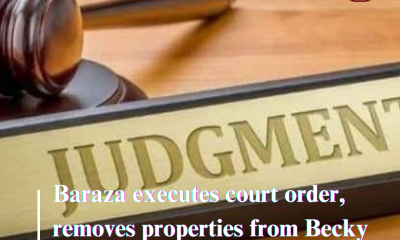Featured
STATE BUILDING IN NIGERIA, THE KALABARI FACTOR AND AND THE SYMBOLISM OF ALABO TONYE GRAHAM-DOUGLAS.

By: Godknows Boladei Igali
They know and call him severally as “Ette” (thanks to IBB), Opu Alabo (Pre-eminent Ijaw Chief), Grandmaster (of ancient Masonic knowledge and mysteries), TOG (an old Port Harcourt boy), Christian Elder and an avowed defender of the faith. More visible to most Nigerians, he is the only citizen who has served the country as Cabinet Minister under four Presidents. Alabo Tonye Graham-Douglas, joined the privileged league of octogenarian on May 8, 2019 as he became 80 years of age.
Though recently tainted by the spilled blood of its martyrs, the its true “garden city” silhouette reawakened to celebrate one of its greatest ever, in diverse range of religious, cultural and creative engagements. Founded in 1912 and named after then Secretary of Colonies, Lord Lewis Venon Harcourt, the city of Port-Harcourt has always been known as a centre of creative expression, aka the great composer, Dr. Adam Fiberesima, Highlife King, Cardinal Rex Jim Lawson, Playwright, Professor Ola Rotimi and up to contemporaries multi-talented artists – Julius Agwu and Bikiya Graham-Douglas (Alabo’s daughter).
More significantly however lies the deeper import and symbolic worth of Alabo as a typology of statesmanship and national service. The worth of the day also brings to focus the contributions which the Kalabari Kingdom of which he is a citizen and holds the exalted traditional title of Orubibi 11 have made to the building of the Nigerian state.
The Kalabari Kingdom is a subgroup of Ijaw, Nigeria’s fourth largest ethnic group. Although the Ijaws are indigenous in the five other coastal states of Bayelsa, Delta, Ondo, Edo and Akwa Ibom, and settled in other coastal areas, the Kalabaris are only concentrated in Rivers State. They had originally moved about the 13th century from the Mein Cluster of clans in the present Bayelsa/Delta border region to settle in more eastern swamps of present Rivers State. Their epochal ancestor, Perebo, who took them to their present location about the 13th century was actually a senior son of Mein Owei. His name “Perebo” – a child of inheritance- underscores his standing in the family. Unlike the familiar narrative of dispute as a source for migration, historical accounts have it that Perebo moved closely to the Atlantic coast peacefully to enable explore new frontiers.
The eastward movement turned gratuitous and fruitful as his descendants became one of the first African groups to experience contact with Europe. This aided their rapid economic growth and social development. The Kalabari Kingdom, which now had firm control over fair amount of European trade with the interior, whether in slaves or the interior, from the 16th century, therefore rapidly expanded exponentially. From the original settlement of Elem Kalabari (Old Town) they built new cities such as Bakana, Abonnema, Buguma, Harrystown, Kula – thriving and rading cities.
The Kalabari people easily became more affluent than other Ijaw neighbours such as Nembe, Bonny and Opobo and Okrika. The Kalabari kingdom also quickly dwarfed other neighbouring non Ijaw groups such as Efik and Ibibio in terms of exposure to western education. Not surprisingly, in quick succession they produced some of Nigerias first set of educated persons, professionals and bureaucrats. Agreed that the Church Missionary Society (CMS) established primary schools in Nembe in Bonny in 1864 and 1868 respectively. Agreed that King William Dappa Pepple of Bonny had attend school in England as back as 1850s and the first university graduate from Ijawland, was George Jumbo in 1856 also from Bonny. However, the Kalabaris on whose soil the first school opened in 1874 soon took over dominance in knowledge. They chunned out, amongst others, Chief GKJ Amachree, first indigenous Solicitor General of the Federation and first African Under Secretary General of the United Nations, first Permanent Secretary of Federal Ministry of Education, Aroloye Feniobu Ajumogobia (father of former Minister of Foreign Affairs, Barr Odein Ajumogobia), first indigenous and longest serving Principal of Government College Umuahia, Isaac Erekosima, Professor Afonya Bestman, became the first African ever to obtain a postdoctoral Doctor of Science in Mathematics from the University of London, Richformer attorney General of Nigeria and pioneer Senior Advocate of Nigeria (along with Chief Rotimi-Williams), Chief Napo Graham-Douglas, Ace Diplomat and Administrator, Amb Joe Iyalla, Musical Maestro and father of Highlife, ‘Cardinal Jim Rex Lawson, former Chief Judge of Rivers State, Chief Donald Graham-Douglas, academic and former Minister Prof Tam David-West, world acclaimed gynaecologist, Professor Kelsy Harrison and founding UNILAG Professor of Paediatric Surgery, Professor Melford Graham-Dougla . Others are Nigeria’s ace philanthropist and politician, Chief O.B. Lulu-Briggs, former Security Chie, Chief Albert Horsfall, former Miss World, Agbani Darego, great footballer and former Captain Green Eagles, Taribo West etc. In the private sector, the Kalabaris impact remains indelible in virtually all aspects of the national economy.
The truth is that Alabo himself comes from a great family of merchants and later public servants. From the establishment of his town, Abonnema in 1882, the soon to become the commercial entrepot of the area. The patriach of the family Opudau Orubibi who was the religious leader of the pioneering founders of Abonnema soon emerged in the port town as one of the most prominent merchants. This was during the period of “Legimate Trade ” in farm produce, especially Palm oil and kernel. By 1884 Abonnema and all of Kalabari land became part of Oil Rivers Protectorate and thereafter Niger Coast Protectorate between 1893 to 1900. From 1900, this area became part of Protectorate of Southern Nigeria until January 1, when Lord Luggard’s Amalgamation Proclamation came into force. Although Opudau Orubibi was a traditionalists of great repute, he foresaw the new dawn and ensured that his heir, whom his English trading partners named Graham Douglas, embraced Christianity and followed the ways of the ‘While Man’. It remained for Alabo’s father, Graham-Douglas to ensure that his children received the foundation to rise to prominent positions in the new nation, Nigeria.
Hence all his elder siblings Napo, Melford, Donald and Godknows all became mighty men of their time. Unfortunately, almost all of Alabo’s high flying elder brothers, did not enjoy the benefits of good old age. Most of them went to rest, habitually, before or just after the basic biblical minimum of “three score and ten years”. In making it to four-score, he has demystified a supposed jinx, which obviously never existed.
Young Tonye attended secondary schools in Lagos and Port Harcourt. Thereafter he proceeded to study at Acton Technical School, London (19631965) before rounding up undergraduate life at the University of Lagos (19651969). There, he earned a degree in Botany and Zoology.
Following the family’s knack for public service, his first working experience was at the Port Harcourt, which was the premier industrial establishment in the country’s oil capital. He rose steadily to the top between 1969 to 1977. The refinery itself was set up in 1965 and an initial 60, 000 barrels per day processing capacity. Unlike today when that premier refinery now stands at 210,000 bpd but is a shadow of its itself, those were days when such national assets operated at over 80% installed capacity.
The brief exit from public service enabled him enter to the private sector, emerging one of the most outstanding in the city of Port-Harcourt. Besides oil and gas which had become his area of proficiency, he established his mark in hospitality industry, through a chain of hotels under the ‘Muriela Group’ – named his wife.
Coming from his family background, he soon found himself in government as Commissioner responsible for Youth, Sports and Culture l and member of the Rivers State Executive Council in 1986. While his portfolio was unusually loaded, Alabo shown a level of dexterity and never seen before in Rivers State or across the country. By the time he completed his tenure, his legacy had become attributed, amongst other things as completing the iconic Alfred Diette-Spiff Civic Centre, the nation’s pioneer Sports Institute in the town of Isaka in the outskirts of Port-Harcourt. He also initiated and commenced the construction of Port-Harcourt’s huge Liberation Stadium. Under his watch River State also became the highest region at national competitive activities bordering on arts, culture and sports. He also organised the first major “Caribbean style” modern carnival in Port-Harcourt in 1988. Today city carnivals have become a national phenomenon, especially in other cities such as Calabar, Abuja, Owerri and Lagos.
It was not surprising therefore when the government of former military President, General Ibrahim Babangida, which had a renown for cultivating and incubating the very best around Nigeria, headhunted him into the Federal Executive Council in 1989 as Minister for Social Development, Youth and Sports arising from the good work in Rivers State. Under IBB, he was later in charge for Aviation till 1992. He remains remembered as the main author of a deregulated aviation industry in Africa’s largest economy. He ended up as one of IBB’s favourite cabinet colleagues.
During the rest of military rule under General Sani Abacha and Gen Abdulsalami Abubakar, 1993 to 1998, Alabo continued to serve in various ministerial portfolios. He known to have been exceptionally close and loyal to General Abacha, arising out of friendship built over the years when the latter was middle level military commander in Port-Harcourt. Many hold the view that Alabo leveraged on relationship with Gen Abacha to attract attention to several Pan-Niger Delta initiatives. Of particular note was the role which he and the likes of fellow Ijawman, Chief Dan Etete, then Minister of Petroleum played towards the creation of a wholly Ijaw state – Bayelsa – October 1996.
The years of active presence at the federal level positioned Alabo as a major power broker in the politics of Nigerias Fourth Republic. By the time political alliances were cobbled into interest groups, he emerged one of the founding fathers of the Peoples Democratic Party, which from 1999 to 2015, became Africa’s biggest political movement. As a matter of fact, at the party’s first Convention in the north central city of Jos in December 1998, he joined other great Nigerians such as former Vice President, Dr. Alex Ekwueme, Former Petroleum Minister, Don Etiebet, Former Anambra Governor, Jim Nwobodo and former Super Permanent Secretary and National Planning Minister, Philip Asiodu and Sen Francis Ellah, to challenge Chief Olusegun Obasanjo for the Presidential ticket. Alabo emerged 4th in the primaries and became even more, a national phenomenon. Not surprisingly, President Obasanjo appointed him as Minister of Labour in 1999 but by 2000 replaced Chief Ojo Madueke as Minister for Culture and Tourism.
Although, for nearly 20 years he became a major factor in the corridors of power in Abuja, he also became the power broker in the politics of the South-South, particularly in Rivers and Bayelsa states where he installed Governors, Senators, etc.
A man of great charm, amiable visage and prepositional gifts, Alabo’s high profile public service remains an enigma spanning his entire adult life. For example, he is amongst very few people in the whole world and definitely alone in Nigeria whose services were found of value by four separate Heads of State of any nation.
But more than all these are the didactic import of his story. Alabo was definitely not the only Nigerian who was born into a family of privilege. As a matter of fact, the greatest challenge which lied ahead of him in such setting was to live in the shadows of towering big brothers. By relying on deep spirituality, hard-working lifestyle and perseverance he had to carve out his own path. One underlying nugget which many easily restate is his true hearted commitment to friendships. With each of such names as IBB, Abacha, Gen Theophilus Danjuma, the Obi of Onitsha, His Majesty, Igwe Nnaemeka Achebe, Oba Otudeko, the Chagoury, General Ike Chief Ephraim Faloughi, King Ebitimi Banigo, Nwachukwu, the Chagoury brother, Sultan of Sokoto, His Eminence Sultan Sa’ad Abubakar, Alabo maintains an unusual bond and closeness.
Despite the vicissitudes of life, including hardnosed political maneuvers, betrayals, repeated business failures and not the least, battle with Cancer which he survived and closer to the heart, no few failed marriages, Alabo remains unwavering about the beauty of life. Alabo’s triumphant life recital is the more, a great source of inspiration and hope to many Ijaw and particularly, Kalabari youths. This particularly so, because despite the regions pioneering exposure to western civilization and contributions to national oil dependent economy, the people like their other neighbours remain largely in the margins, if not out outright exclusion on many fronts. Hence his ‘palace’ in Port-Harcourt remains the meeting point for all, from Mujadeen Asari Dokubo to King Ateke Tom, Ebikabowei Victor Ben (Boyloaf) and the rest, as the region tries to chart a way forward for itself. To many, this greyed 80 year old grandfather remains a reference of success and a palpable hope for a new tomorrow for the Ijaws and for that matter, the people of the Niger Delta.
Now an Elder under the feet of one of south south’s Church leaders, Apostle David Zilly-Aggrey and his Royal House of Grace, the legacy in service to Nigeria’s common good by Alabo and his kinsmen from Kalabari Kingdom and ijaw ethnic nationality, in virtually all areas of national life remains of unparalleled worth.
Happy birthday, Leader, Elder, Opu Alabo Opudau Orubibi.
GODKNOWS IGALI, PHD IS A DIPLOMAT/ADMINISTRATOR AND 2015 WINNER OF US BOOKS REVIEW STELAR GOLD PRIZE FOR LITERARY EXCELLENCE
-

 News3 days ago
News3 days agoFamily, Friends Celebrate Jailed Former Deputy Senate President, Ike Ekweremadu’s Birthday
-

 Niger Delta6 days ago
Niger Delta6 days agoNiger Delta Stakeholders Accuse Olu of Warri and PINL Management of Dishonesty Over Terminated Pipeline Contract
-

 Politics3 days ago
Politics3 days agoPROPHESY TO PRESIDENT BOLA AHMED TINUBU ABOUT 2027
-

 Politics7 days ago
Politics7 days agoRivers’ crisis: Timi Frank to TInubu, APC: Wike’s illegal impeachment plot against Fubara distabilze your administration
-

 Politics7 days ago
Politics7 days agoOgbia Council Boss, Appoints Prince Isaac Amakuro as Political Secretary
-

 News6 days ago
News6 days agoBaraza executes court order, removes properties from Becky father’s residence
-

 Business3 days ago
Business3 days agoBaraza: Bribena pleads for understanding, highlights solutions to organization’s problems
-

 Business6 days ago
Business6 days agoWema Bank Unveils CoopHub, Nigeria’s First Digital Platform for Cooperative Societies




